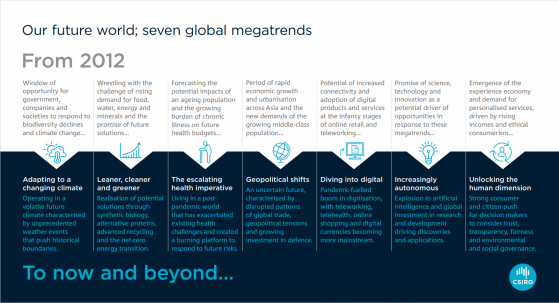The Commonwealth Scientific and Industrial Research Organisation (CSIRO), Australia's premier scientific institution, has unveiled seven global megatrends that are expected to have far-reaching implications for Australia's economy, society and governance through 2042.
The report, aptly titled ‘Our Future World’ comes as an update to CSIRO's similarly groundbreaking report from 2012 and casts an analytical gaze upon the multifaceted geopolitical, social, technological, economic and environmental forces that are shaping the world today.
The seven megatrends enumerated in the report are:
- adapting to climate change;
- leaner, cleaner and greener;
- the escalating health imperative
- geopolitical shifts;
- diving into digital;
- increasingly autonomous; and
- unlocking the human dimension.
According to the study, Australia stands at a strategic juncture where it can leverage its robust wind and solar energy capacity, as well as advancements in artificial intelligence, to meet these challenges.
Marshall estimated that the next wave of digital innovation could generate 10-15 trillion US dollars globally.
"Australia can tap into this to transform existing jobs and create new jobs and wealth while leveraging artificial intelligence to solve some of our greatest challenges," he added
#Australia has the highest wind and solar capacity per capita of any developed nation. A wealth of critical minerals needed for low emissions technologies and a skilled workforce. We can become a global superpower in clean energy industries.https://t.co/Rk4o6Gs5cb#QandA— CSIRO (@CSIRO) September 18, 2023
No industry remains untouched
When examining the sectors most impacted by these megatrends, it becomes evident that no industry remains untouched.
For instance, climate change could result in natural disasters costing the Australian economy almost three times more by 2050 compared to 2017.
The renewable energy sector, backed by synthetic biology and advanced recycling, is anticipated to surpass coal as the primary energy source by 2025.
Healthcare faces an escalating imperative underscored by an ageing population and increased risk of chronic disease and mental health issues.
Moreover, global military spending reached an all-time high of US$2.9 trillion even as the global economy contracted by 3.2% in 2020, hinting at geopolitical volatility.
The digital landscape also presents opportunities and challenges with 40% of Australians working remotely and cybercrime rates escalating by 13%.
Trust - central theme
Our Future World report co-lead author Dr Stefan Hajkowicz highlighted the effects of digital transformation in the post-pandemic world.
“In this environment, digital skills will become more valuable, but rather than replacing human intelligence, technologies like AI will assist us in doing our work better,” he added
Dr Claire Naughtin, another co-lead author of the report said: “Trust emerged as a central theme – trust in institutions, technology, supply chains and security will all be key issues over the coming two decades.
"Currently just under 70% of Australians do not trust AI systems but would be more willing to use these systems if appropriate ethical measures were in place.
“This latest update on the global megatrends gives us a line of sight as to what has changed over the past decade and a view to the coming decades.
"Like aircraft engineers would use wind tunnels to test the robustness of new aircraft, we can use these megatrends to develop, test and refine future strategies to ensure they are robust, whatever the future holds.”
Urges collaborative efforts
Marshall closed with a call to action, urging collective efforts to seize the opportunities presented by these megatrends.
“We have the opportunity now to use science to invent the kind of world we want to live in – but we have to act, and we have to do it together,” he emphasised.
This CSIRO report, rich in data and strategic foresight, is indispensable for policymakers, businesses, and the general public as they navigate the complex challenges and opportunities that lie ahead.
Read more on Proactive Investors AU
